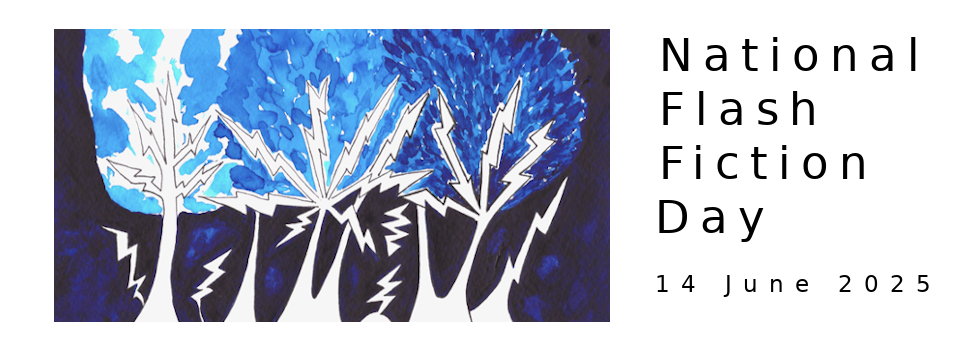Welcome to the second in a series of interviews with this year's National Flash Fiction Day anthology editors and micro fiction competition judges! This week, Santino Prinzi is in conversation with micro fiction competition judge and Costa Short Story Award winning author, Angela Readman. They talk about Angela's recently published debut novel, and Angela offers tips for writing brilliant flash fiction...
Santino: Welcome, Angela! Your debut novel, Something Like Breathing, has just been published by And Other Stories. Congratulations! Could you tell us a little bit more about your novel?
Angela: Hello, and thank you! It’s about friends who live on an island, Sylvie and Lorrie, growing up in the 50’s. It starts with the words, ‘I’d tell you about Sylvie, but you wouldn’t believe me.’ I didn’t think I was going to write a novel when I wrote those lines, to be honest. I’d hoped it would be a short story. I’d had some lovely support for my story collection Don’t Try This at Home and really wanted to do another, but the characters wouldn’t let me. I found they all had so many stories within their lives, from a mother obsessed with Tupperware, to a grandfather who runs a distillery and refuses to wear matching clothes. I had to keep writing to find out who these people were. They kept on surprising me.
Santino: I can't wait to read it! Now, some people argue that writing short stories and flash fiction is a “good warm up” for writing a novel, which potentially ignores the different skills and qualities required to write these different forms. What are your thoughts on this? What freedoms or restrictions did you feel when writing Something Like Breathing that you don’t experience writing flash fiction?
Angela: I don’t like the idea that flash or short stories are practice exercises for writing something longer. It sounds like the short form is somehow less valid. I don’t buy into that. Flash is its own art form and it’s amazing. Novels are completely different. They both have their own challenges and aren’t trying to do the same thing. When I write flash, I’m after a glimpse of something, perhaps something I don’t understand instantly. It’s like catching something out of the window of a speeding car.

With a novel, it’s more like being invited in to the house of a stranger. There’s space to look around and really get to know them. It was fascinating. I loved being able to see the characters grow over years in their lives. I found the challenge was there’s no Off switch when you spend that amount of time with characters. It feels like you carry them around with you wherever you go. I’d be in the supermarket and suddenly wonder if Sylvie likes tomatoes. I didn’t anticipate that. It was pretty intense.
Santino: Many of your stories offer a sense of surrealism cemented in the normal every day, for example, your story ‘Attack of the Robot Grannies’ in last year’s anthology feels both otherworldly and of this world. Is blurring the lines of possibility something you enjoy doing in your writing?
Angela: I love blurring the lines of possibility. I wouldn’t really describe my work as magical realist, it’s probably more realist magical, or everyday surrealism or something. The work’s grounded in the everyday, but anything could happen there. I hope it can anyway! I’ve written realist work, but I’m drawn to the strange. I’m not sure why. I think it’s something to do with a sense of limitation. I often write characters who seem limited by their location, status or circumstances, ordinary people with ordinary lives. I hate the idea that our opportunities should be limited though, whether it’s by where we live or social status, or whatever, so things that seem impossible always creep in. The women in Attack of the Robot Grannies had such boring office lunches they just needed those grannies.
Santino: It sometimes feels like writers are under pressure to always be putting words on the page. Are there any other activities, cultural or otherwise, that you feel can be just as helpful to a writer?
Angela: There’s a sense we should always be writing, but there’s only so long anyone can stare at a screen. It’s useful to do something completely different sometimes, like going to a museum or art gallery, standing still and really looking at something. I also started making things with felt last year. I wanted to try a craft I’d never tried and stick with it for a year.
There’s something about accepting you don’t know anything and are just trying something out that can be freeing when you come back to writing. Rather than abandon work, or feel it should be perfect instantly, some of that feeling of just giving it a whirl is brought to the page.
Santino: You won our very first National Flash Fiction Day Micro Fiction Competition and you have judged thousands of micros for us. What are your top tips for authors who wish for their micros to shine?
Angela: It has been a real pleasure to read so much flash. There’s no one way to write it. The joy is flash can be anything, traditional in structure or more experimental. It’s so surprising! The most common mistake I see is trying to fit too much in and generalising to fit it all in. Flash is powerful when it’s specific. It doesn’t need to explain itself. Trust your readers, with something so short it’s amazing how far they’ll come with you. Choose each word wisely and let that do the work. Write your flash, leave it, then go back and edit. Then edit again. Just to be sure, do that again until there isn’t a word you could change.
 Angela Readman is the winner of the first National Flash Fiction Day competition. Her short stories have since been winners of The Costa Short Story Award, The Mslexia Story Prize and The Anton Chekhov Award for Short Fiction. Her story collection Don't Try This at Home was short listed in The Edge Hill and won The Rubery Book Award. In January 2019 her debut novel Something like Breathing was published by And Other Stories. She also writes poetry and is published by Nine Arches.
Angela Readman is the winner of the first National Flash Fiction Day competition. Her short stories have since been winners of The Costa Short Story Award, The Mslexia Story Prize and The Anton Chekhov Award for Short Fiction. Her story collection Don't Try This at Home was short listed in The Edge Hill and won The Rubery Book Award. In January 2019 her debut novel Something like Breathing was published by And Other Stories. She also writes poetry and is published by Nine Arches.
SUBMISSIONS ARE NOW OPEN for this year's National Flash Fiction Day Anthology and Micro Fiction Competition. Submissions close on 15th March 2019. For more information, please visit our Anthology and Competition pages.
We are also trying to secure funding to offer free entries to disadvantaged and marginalised writers. If you would like to help us do this by donating entries, please contact us at nationalflashfictionday@gmail.com.
